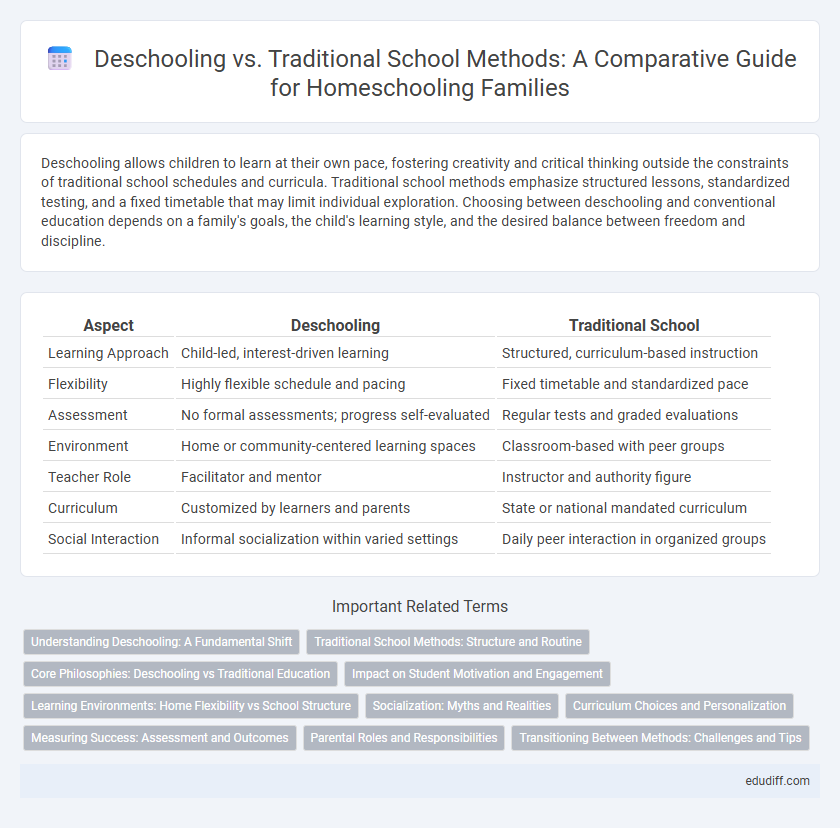Deschooling allows children to learn at their own pace, fostering creativity and critical thinking outside the constraints of traditional school schedules and curricula. Traditional school methods emphasize structured lessons, standardized testing, and a fixed timetable that may limit individual exploration. Choosing between deschooling and conventional education depends on a family's goals, the child's learning style, and the desired balance between freedom and discipline.
Table of Comparison
| Aspect | Deschooling | Traditional School |
|---|---|---|
| Learning Approach | Child-led, interest-driven learning | Structured, curriculum-based instruction |
| Flexibility | Highly flexible schedule and pacing | Fixed timetable and standardized pace |
| Assessment | No formal assessments; progress self-evaluated | Regular tests and graded evaluations |
| Environment | Home or community-centered learning spaces | Classroom-based with peer groups |
| Teacher Role | Facilitator and mentor | Instructor and authority figure |
| Curriculum | Customized by learners and parents | State or national mandated curriculum |
| Social Interaction | Informal socialization within varied settings | Daily peer interaction in organized groups |
Understanding Deschooling: A Fundamental Shift
Deschooling represents a fundamental shift from traditional school methods by emphasizing learner autonomy and experiential learning over structured curricula and standardized testing. This process allows students to transition from a rigid school environment to self-directed education, fostering critical thinking, creativity, and intrinsic motivation. Embracing deschooling helps break down institutionalized learning habits, encouraging personalized pace and interests in homeschooling environments.
Traditional School Methods: Structure and Routine
Traditional school methods emphasize a structured environment where fixed schedules, standardized curricula, and routine assessments guide student learning. This approach fosters discipline, time management, and consistent academic progress through repetitive and systematic instruction. Such a framework supports clear expectations and measurable outcomes, often prioritizing uniformity over personalized learning experiences.
Core Philosophies: Deschooling vs Traditional Education
Deschooling centers on learner autonomy, emphasizing self-directed exploration and personalized knowledge acquisition outside the constraints of standardized curricula. Traditional education prioritizes structured instruction, uniform assessment, and teacher-led content delivery to maintain a consistent learning framework. The core philosophical divergence lies in deschooling's critique of institutionalized schooling as restrictive, contrasting with traditional education's stress on discipline, order, and measurable academic outcomes.
Impact on Student Motivation and Engagement
Deschooling fosters intrinsic motivation by allowing students to explore interests at their own pace, contrasting with traditional school methods that rely heavily on structured curricula and external rewards. Research shows that deschooled students often exhibit higher engagement through personalized learning experiences tailored to individual strengths and passions. Traditional schooling may hinder motivation due to rigid schedules and standardized testing, which can lead to disengagement and decreased enthusiasm for learning.
Learning Environments: Home Flexibility vs School Structure
Homeschool environments offer unparalleled flexibility, allowing tailored learning schedules and personalized pacing that adapt to each child's unique needs. Traditional school settings provide a structured environment with fixed timetables and standardized curricula designed to promote social interaction and consistent academic benchmarks. This contrast highlights how homeschooling supports individualized exploration, while schools emphasize group learning dynamics and routine stability.
Socialization: Myths and Realities
Homeschooling often challenges the myth that deschooling hinders socialization by providing diverse, real-world interactions beyond traditional school settings. Traditional schools offer structured peer engagement, yet many homeschoolers develop social skills through community activities, sports, and co-ops, demonstrating varied but effective socialization methods. Research indicates that socialization quality depends more on the environment and opportunities than the schooling method itself.
Curriculum Choices and Personalization
Deschooling emphasizes flexible curriculum choices that prioritize individual interests and learning pace, contrasting with traditional school methods which often follow rigid, standardized curricula. Personalized learning in deschooling allows students to explore subjects deeply and develop critical thinking skills, whereas traditional schools typically rely on uniform lesson plans and assessments. This approach fosters intrinsic motivation and adaptability, aligning education with each learner's unique needs and goals.
Measuring Success: Assessment and Outcomes
Measuring success in deschooling emphasizes personalized learning assessments, prioritizing student engagement and intrinsic motivation over standardized test scores commonly used in traditional school methods. Outcomes in deschooling often include enhanced critical thinking, creativity, and self-directed learning skills, contrasting with the structured academic benchmarks and grade-focused evaluations of conventional education. This approach allows for flexible, qualitative evaluations tailored to individual growth, providing a holistic view of student achievement beyond numerical metrics.
Parental Roles and Responsibilities
Parental roles in deschooling emphasize facilitating autonomy and fostering a child-led learning environment, contrasting with traditional school methods where parents often act as enforcers of standardized curricula and schedules. Responsibilities in deschooling include nurturing curiosity, adapting to children's natural learning rhythms, and providing resources tailored to individual interests, whereas traditional schooling relies on parents ensuring compliance with prescribed academic benchmarks and extracurricular requirements. This shift from authoritative oversight to collaborative mentorship fundamentally transforms parental engagement and enhances personalized education outcomes.
Transitioning Between Methods: Challenges and Tips
Transitioning from traditional school methods to homeschooling requires deschooling to unlearn conventional classroom habits and foster self-directed learning. Parents face challenges such as adapting curriculum flexibility, managing socialization opportunities, and establishing personalized routines. Effective tips include setting realistic expectations, gradually adjusting schedules, and connecting with homeschooling communities for support and resources.
Deschooling vs Traditional School Methods Infographic

 edudiff.com
edudiff.com